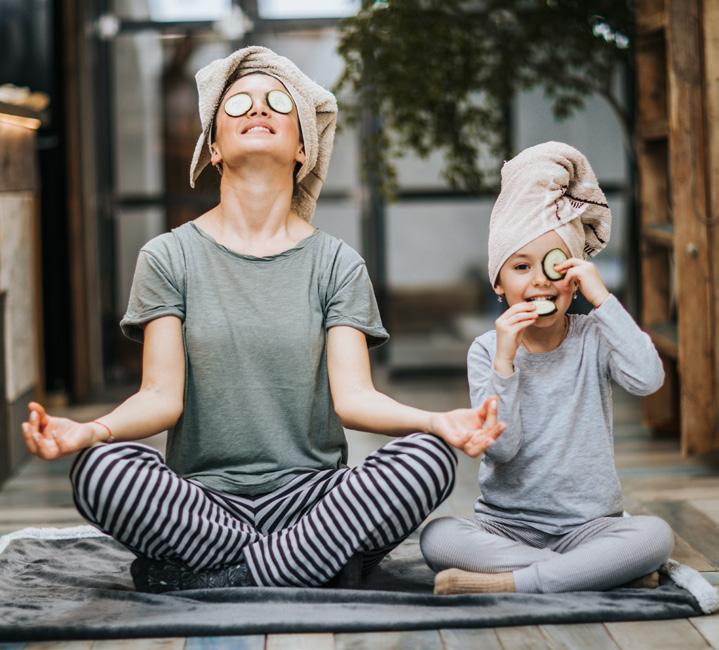
14 minute read
Harnessing and Strengthening Our Physical and Spiritual
Harnessing and Strengthening Our Physical and Spiritual Interconnections: Finding Peace and Health During Isolation with Dr. Shamini Jain and Dr. Jim Bentz
By Ainsley Schoppel Today’s world is one that is somewhat unrecognizable to most individuals, businesses, families, and societies. In the blink of an eye, our predictable stability shifted, and we have all had to adapt in unique and varying ways to this new and separate way of living. We know that well-being builds and boosts immunity, so how are we to cope with this sudden influx of stress? How can we shift our mindset, and in turn, our biology, to avoid the short-term pitfalls of selfish actions and reactions? How are we supposed to continue or adopt a mind-body-spirit practice when our daily responsibilities constantly surround us? Dr. Shamini Jain and Dr. Jim Bentz answer the call for help and give us concrete explanations as to what is happening inside and outside of our beings and offer ways that we can help ourselves and others to strengthen health and bolster happiness.
Advertisement
Dr. Jim Bentz is the top practitioner and trainer for Neurological Integration System (NIS) in the United States, teaching healthcare practitioners the principles of Functional Neurology. Dr. Bentz has utilized NIS—a system that incorporates ancient eastern medicine practices with current neuroscience to promote self-healing through the detection and correction of signaling disruption in the nervous system—as his primary modality since 1997. And as a clinical psychologist, scientist, and founder and CEO of the Consciousness and Healing Initiative (CHI)—a non-profit collaborative accelerator that connects scientists, health practitioners, innovators, and social entrepreneurs to advance the science and practice of healing—Dr. Shamini Jain is on the forefront of a necessary revolution in science, medicine, and healing. She also serves as an Assistant Professor of Psychiatry at the University of California, San Diego, and was trained in neuroscience at Columbia University and in clinical psychology and psychoneuroimmunology at UC San Diego.
Trying to grapple with and understand what is happening to us on an individual and collective level as we live through the daily consequences of the COVID-19 crisis is not an uncomplicated mission. In terms of viewing the scenario through the lens of holistic medicine, the interconnections of systems— including our connection to the earth—is crucial for overall health. Fear is an extremely detrimental emotion that can be experienced individually but transmitted through the collective with very real physical and mental consequences. “What we’re seeing out there is a lot of fear right now, and understandably so as this is a scary thing,” Dr. Bentz began. “However, we know that fear activates a part of the brain called the amygdala, also known as the limbic cortex of the limbic area of the brain. The amygdala is also what triggers the fight-flight response. What we know is that when the amygdala is activated, it inhibits a part of the brain called the prefrontal cortex and this is where our executive decisionmaking happens.” In essence, we don’t make sound or wise decisions when we’re afraid. Dr. Jain asserted that, “When we’re in fear, we tend not to think as clearly and rationally as we might otherwise. It also leads us to be more self-referential; in other words, we become more selfish. We act in our own self-interest rather than considering the interests of others.”
No one is immune to fear; it’s an innate and natural human emotion and thinking we can simply turn off this response to danger is impractical and false. “There’s no way that we’re not going to feel a little panicked right now; it’s a serious situation. The media is not making light of it and they shouldn’t, but when newscasters have to share all this to the world, I see their faces and I feel their energy. How are they supposed to transmit anything peaceful when they’ve got all this terrible news they’re constantly sharing, and then what does that do to us?” Dr. Jain questioned. The result is a form of emotional contagion that ignites a fear response. We start to look around us and wonder why everyone is hoarding toilet paper and other essential items, which makes us feel as if we need to do the same. And as Dr. Jain reminded us, this happens because the fear-center of our brain is activated through intense media converge and the unknown aspects of the future before us.

We know that fear activates a part of the brain called the amygdala, also known as the limbic cortex of the limbic area of the brain. The amygdala is also what triggers the fight-flight response. When we’re in fear, we tend not to think as clearly and rationally as we might otherwise. It also leads us to be more self-referential; in other words, we become more selfish. We act in our own selfinterest rather than considering the interests of others. “ “

In a time where the typical methods of connecting with others have been restricted, exploring the nature and importance of connections has proven to be a meaningful exercise. “I think everyone is feeling lonely,” Dr. Jain offered. “Not only are people feeling stir-crazy, but they’re lonely; they miss their friends, they miss their social gatherings—we’re social creatures.” As much as we can use technology to ease the isolation and offer a virtual bridge to temporarily connect us to our work and those we love, the effects of missing out on physical interactions cannot be underestimated. Tuning in to the interconnections between organ systems and understanding the impact of isolation, fear, and uncertainty on our bodies is important, but we also need to be aware of the interconnections between each other. So, what can we do to help boost our health? “It might be good to remind ourselves that we have all of these internal capacities that we can redevelop or pay attention to during these times,” Dr. Jain stated. While following current events and staying as informed as possible is important and a daily ritual for most people, we have to be conscious of the fact that we can control the amygdala response. For help in doing just that, we can look to research in
mind-body wellness. “We know that we can engage in positive emotions when we sleep, when we eat decently, when we’re taking care of our mental wellbeing, when we have a very simple mind-body practice every day, and when we really notice what’s happening and working with interpersonal relationships, including resentments,” Dr. Jain noted. There is no doubt that with the seemingly unpredictable nature of COVID-19 and the mortality data constantly presented in the media, our own mortality can be top of mind. Dr. Jain

plainly pointed out that, “We’re all going to die, and spirituality reminds us that death could come for us and our loved ones at any time. It’s an uncomfortable thing and yet this is what fear and anxiety is about in terms of the amygdala response. It’s all because of the thought that I’m going to die or someone I love is going to die, so we can actually meet that head on.” However, the good news is that research has shown that implementing prayer, meditation, yoga, and creative outlets into your life can calm the nervous system. Additionally, when we’re able to express emotions—even negative ones—we strengthen our immune system. These are daily mindful practices and communication techniques that are at our disposal and can be seen as an independent and internal wealth just waiting to be drawn upon.
Dr. Bentz elaborated on the biological aspects of mindful practices by pointing out that they activate the vagus nerve and the parasympathetic response in the body that counters the effects of the activation of the amygdala. “The sympathetic nervous system is like a teetertotter: if our amygdala is activated, it suppresses our parasympathetic system which decreases the reaction of the amygdala.” Dr. Bentz further explained that the vagus nerve also sends information back to the brain about the gut. “We now know how important gut health is to brain health,” Dr. Bentz noted, “and immunity truly starts in the gut. If we can do these things, they will make our immune system so much more resilient and stronger.” Another very powerful component of immune health is sleep. Because we live in an overly sympathetic nervous system world, adequate sleep is critical. “Sleep allows the parasympathetic nervous system to foster immunity— it’s the restorative time for us; it’s so key and it’s such a simple thing to do,” stated Dr. Bentz. Dr. Jain added that a healthy diet free from processed foods also aids in boosting immune health.

Aside from the physical effects of fear and isolation, our current times are also highlighting the importance of compassion. “When we can think about others more than we think about ourselves, it actually activates that parasympathetic nervous system,” Dr. Bentz explained. “What I’ve noticed with a lot of research on love and kindness meditation is that it’s focused on what happens when you train in giving love and kindness. To do that, you get into a beautiful economist state first, and then say some specific things like: ‘May you be safe, may you be happy, may you be at ease, may you know peace.’ Those are some of the simple statements involved with love and kindness meditation. So, we’ve tended to study the meditator; the focus is on the person who’s learning the training and who’s outwardly practicing it,” added Dr. Jain. Since many people are now coming together to pray for the health and safety of the planet, Dr. Jain’s exploration of interconnection through the Consciousness and Healing Initiative is very timely. “We’re trying to take meditation out of what meditation can do for me and my stress level in my brain, but what does meditation do for
What does meditation do for us at the field level? We did some research on this in Pondicherry, India with the Sri Aurobindo Ashram,” Dr. Jain revealed. “We went there and measured frontal EEG in everyone over a number of different conditions. What we found is that when they all went internal together—when they used their specific practice to go into an internal state—we found evidence of EEG coherence between people, not just within the brain. This is ground-breaking! To my knowledge, nobody has really published this. “ “

us at the field level? We did some research on this in Pondicherry, India with the Sri Aurobindo Ashram,” Dr. Jain revealed. “We went there and measured frontal EEG in everyone over a number of different conditions. What we found is that when they all went internal together—when they used their specific practice to go into an internal state—we found evidence of EEG coherence between people, not just within the brain. This is ground-breaking! To my knowledge, nobody has really published this.” An encouraging and empowering takeaway is that when we use our individual and collective meditative powers, we truly have the potential to connect.
“What happens to people when they get in these states of compassion, love, and caring is that not only is it good for us, but it’s good for everybody else, too. I think it’s brilliant. Prayer will take us to that place, and I don’t think it matters what your religion is. To me, prayer is reaching out and having a concern about somebody that you want to help. Or, you have a concern about yourself that you want help with,” Dr. Bentz agreed. In terms of ancient traditions, science and spirituality were never separate. “They’re simply different perspectives of trying to explore and get some understanding of the same truth. There are many different layers of our being, and so there are different ways that we can work with these layers,” he continued. “There is the physical, yes, and in today’s word, physical distancing is important. But you can still pray and that can actually have an effect as well. It’s not one or the other.”
Having some form of self-care to tone down the effects of the sympathetic brain-state is immensely important to achieve balance when so much time is spent alone or with our immediate family. “It’s a wonderful time right now to inwardly explore because people have the time to try it. I think rather than bingeing on Netflix, take an hour a day and just slow down, do some introspection, prayer, or meditation— whatever you want to call it. It’s more important than ever that we connect in that way internally and externally,” Dr. Jain offered. However, these forms of introspection do not have to be formal endeavours that you must undertake at a specific time of day and for an allotted amount of time, because quarantined life can be extremely labour intensive and stressful. “Work can get more intense when you’re quarantined, and on top of it, you’ve got three meals a day to make, dishes to do, you’ve got to make sure everyone is fed, ensure you’ve got food in the house, take care of children, take care of elders, etc. There’s an interpersonal dynamic and I want to honor that and understand that while some of us might have more time to go inwards and reflect, for others— especially if they’re in busy families—it feels as if they don’t have any time,” she continued. There is no perfect way to fit self-care practices into your day, so it truly is about discovering what works for you. “I think even if we can get fifteen minutes a day it’s fantastic—whatever we can get.

Grace is always with us, regardless; that’s what’s so beautiful. It doesn’t even take two minutes to just tune in to yourself in the middle of your busy day while you’re washing dishes,” noted Dr. Jain. “There’s been some interesting research around gratitude and gratitude practices,” Dr. Bentz expanded, “for instance journaling what you’re grateful for. The research is showing some neurological changes happen just by doing that.”
With uncertainty underlining every day and a foggy future ahead of us with no clear path forward, what can we do to feel calm when nervous sadness threatens to overwhelm? Dr. Bentz says to breathe. “Do some meditation with breath, because that’s really been proven to keep the vagal pathway healthy,” he explained. “It’s probably one of the premier things that people can do for their health, because it takes care of so many things. It deactivates the sympathetic system in our brain connection and improves gut health.” And because it’s now known that the vagus nerve regulates inflammation, a simple practice of focusing on your breath and following it in and out for even five, ten, or fifteen minutes is beneficial. Dr. Jain’s Conscious and Healing Initiative’s Facebook page hosts a daily twelve-minute meditation practice that is open to anyone who is looking to focus on their breath and calm their body. “Every day at 07:45 Pacific, 10:45 Eastern, and 04:45 European time we have a training mindfulness meditation facilitator that leads us through twelve minutes of guided practice,” she offered.
Even though there tends to be an illusion of duality between traditional medicine and alternative medicine to achieve healing, the reality is that we’re an interconnected system and we need to view ourselves as such. “My message to people has been that there are things that we can do that may seem ‘out of the box’ from a scientific or medical point of view, but they’re really not—it’s just an expansion of what we already know from science,” Dr. Bentz noted. However, if we’re lucky enough to be at home caring for loved ones and practicing our self-care routines, we have the medical community to thank. “Look at how medical professionals are responding; where would we be without them?” Dr. Jain questioned. “All of these doctors, nurses, and so many different folks are just putting themselves at risk to help others. That’s the heart of the healer; that’s who doctors are.”
So, rest in the knowledge that all of our brains are struggling to make decisions free from fear, and the resulting feelings are unequivocally normal. As best you can, quash stress and boost immunity with mind-body self-care, and search for interconnections wherever they can be found. Breathe in, breathe out, and be well.
ymore info: facebook: @consciousnessandhealing www.chi.is www.shaminijain.com www.fidalgoislandhealthcenter.com facebook: @drjimbentz










